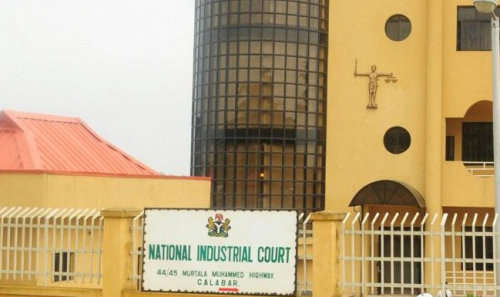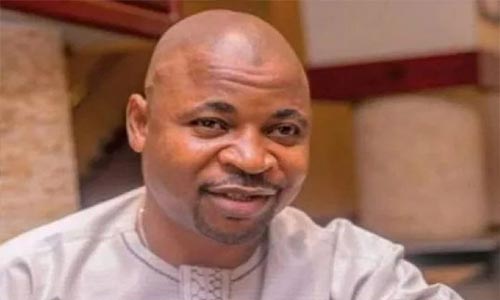COURTROOM NEWS 31/03/2023
[FGN-ASUU Dispute] Industrial Court Dismisses Suit Filed by SERAP, Nigerian Students

The Hon. President of the National Industrial Court, Hon. Justice Benedict Kanyip, PhD, OFR has dismissed the case filed by The Incorporated Trustees of Social-Economic Rights and Accountability Project (SERAP) and 5 Nigerian Students against the President Federal Republic of Nigeria, Minister of Labour and Productivity, and the Attorney General of the Federation for lack of legal capacity.
Justice Kanyip held that SERAP’s assertion as a watchdog for transparency, accountability, protection and promotion of the rule of law does not make them the policeman of a trade dispute such as that between the FGN and ASUU.
The Court declared SERAP and 5 Others as busybodies and meddlesome interlopers, and for not being privy to the FGN-ASUU agreement(s), they have no locus standi to bring the suit.
From facts, the 1st claimant- SERAP is a civil society organization registered under the Companies and Allied Matters Act (CAMA) with the mandate to promote human rights, democracy, media freedom and anti-corruption in Nigeria, among other objectives, and the 2nd to 6th claimants -Dongo Daniel, Oyebode Babafemi, Ejie Kemkanma, Peter Itohowo Aniefiok and Imam Naziru are respectively students of Plateau State University, Obafemi Awolowo University, University of Port Harcourt, University of Uyo and University of Ibadan.
SERAP and 5 Others had asked for A DECLARATION that the refusal of the FG to implement the terms of the FGN-ASUU Renegotiated 2009 Agreements and the 2020 Memorandum of Action which has occasioned the prolonged strike action is unlawful, inconsistent and incompatible with Nigeria’s human rights obligations and constitutes a violation of the citizens’ right to quality education guaranteed under the African Charter on Human and Peoples’ Rights, International Covenant on Economic, Social and Cultural Rights 1976 among others.
In defense, the defendants- the President Federal Republic of Nigeria, Minister of Labour and Productivity, and the Attorney General of the Federation filed a preliminary objection and prayed the court to dismiss the case on the ground that SERAP and 5 Others are not parties to the FG – ASUU ‘re-negotiated 2009 agreements and the 2020 Memorandum of Action’, and also lack the legal capacities to enforce the said ‘agreements’ even if made for their own benefits.
FG further averred that SERAP and 5 Others’ action is founded on gross illegality and lawlessness and thus, cannot be maintained by the court.
In opposition, SERAP averred that pursuant to its quest for accountability in public service and unfettered freedom of Nigerians, the suit was instituted as interventionist approach and as commitment to the educational welfare of the Nigerian Students who are also co-claimants in the suit, having witnessed and experienced the perennial effects of the defendants’ willful refusal to implement the agreement under review and it is only logical and encouraging that they have decided to seek the judicial intervention in the circumstance and to argue that they have no standing to do so is aberrant and must be discouraged by the Court.
SERAP prayed for the instant suit to be consolidated with the Federal Government of Nigeria & ORS -VS- Academic Staff Union of Universities that is pending before the Court for effective and effectual resolution of issues involved.
In a well-considered ruling, the presiding Judge, Hon. President of the Court, Hon. Justice Benedict Kanyip discountenanced the FG’s argument that the case is founded on illegality and held that the merit of the case must be considered in order to determine whether the reliefs are founded on illegality, that merely citing section 43(1)(b) of the TDA is not sufficient to brand the reliefs illegal since there is a good deal of ILO literature in that regard that may require consideration given the jurisdiction and power of this Court to apply international best practices in labour, and conventions, treaties, recommendations and protocols ratified by Nigeria in virtue of section 254C(1)(f) and (h) and (2) of the 1999 Constitution.
The Court ruled that there is no deposition that SERAP, Dongo Daniel and 4 other Nigerian Students were parties to the FGN-ASUU agreement, and the argument of SERAP that privity cannot be decided by merely looking at the heading of the agreement is one that is baseless and irrelevant given their deposition to the matter.
Justice Kanyip held that SERAP’s assertion as a watchdog for transparency, accountability, protection and promotion of the rule of law does not make them the policeman of a trade dispute such as that between the FGN and ASUU.
“I agree with the defendants that the jurisdiction of this Court cannot be exercised where as in the instant case securing enforcement of fundamental rights is an accessory part of implementing the FGN-ASUU agreement 2009 as styled by the claimants and implementing the 2020 Memorandum of Action.” Court ruled



